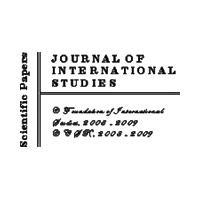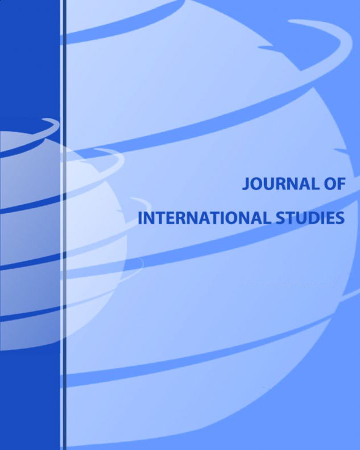



The Journal of International Studies only accepts original and authentic extended papers (approx. 8-12 A4 pages) on a regular basis, which have never been published before or are submitted/under consideration in another means of publication (e.g. another scientific journal, a scientific conference or a working paper, a report, etc.). JoIS uses a double blind review process to ensure quality of the contributions.
Please, sent your original and authentic papers by e-mail to:
The preferred dates for submitting papers are: by 20th January and by 20th May each year. Papers should be of 8-12 pages in length (1.0-spaced, Times New Roman 12) including the following obligatory parts:
Acknowledgments
Authors must list all sources of research support relevant to the article. All grant funding agency abbreviations should be completely spelled out. Declaring funding sources acknowledges funders’ contributions, fulfills funding requirements, and promotes greater transparency in the research process.
Examples of Funding Statement:
References
References must be in Harvard style. References should be clearly cited in the body of the text, e.g. (Smith, 2006) or (Smith, 2006, p.45), if an exact quotation is being used. At the end of the paper the author(s) should present full References in the alphabetical order as follows:
Submissions
Submissions are accepted all year round with the current waiting time of max. 6 months. When papers are reviewed and selected from scientific events (seminars and conferences), the participation fee already includes the publication charge in JIS.
Finally, papers, as with all other aspects of the Journal, can be addressed to the Editorial Office:
Journal of International Studies,
Mickiewicza str., 64, 71-101, Szczecin, Poland tel. +48914442086
www.jois.eu
Authors submitting articles for publication warrant that the work is not an infringement of any existing copyright and will indemnify the publisher against any breach of such warranty. For ease of dissemination and to ensure proper policing of use, papers and contributions become the legal copyright of the publisher unless otherwise agreed.
The following license will apply to the article: CC BY
The CC BY license lets others distribute, remix, tweak, and build upon your work, even commercially, as long as they credit you for the original creation. This is the most accommodating of licenses offered. Recommended for maximum dissemination and use of licensed materials.
The publisher will apply the Creative Commons Attribution Works 3.0 Unported License (CC-BY) to the Article for the purposes of publication in the journal on an Open Access basis. For further information, see the Open access options page. The full details of the license are available at http://creativecommons.org/licenses/by/3.0/legalcode.
The Editorial Board of “Journal of International Studies” follows the rules on academic writing and academic ethics, according to the work by Miguel Roig (2003, 2006) “Avoiding plagiarism, self-plagiarism, and other questionable writing practices: A guide to ethical writing”, available online at http://www.cse.msu.edu/~alexliu/plagiarism.pdf.The Editorial Board suggests to potential contributors of the journal, reviewers and readers to dully follow this guidance in order to avoid misconceptions in academic writing. Editors will blind referee all manuscripts as will reviewers, to the guidelines explicitly highlighted by COPE http://publicationethics.org.
Editor-in-Chief: Dr Jurij Bilan
Deputy Editor-in-Chief: Dr Jakub Gazda